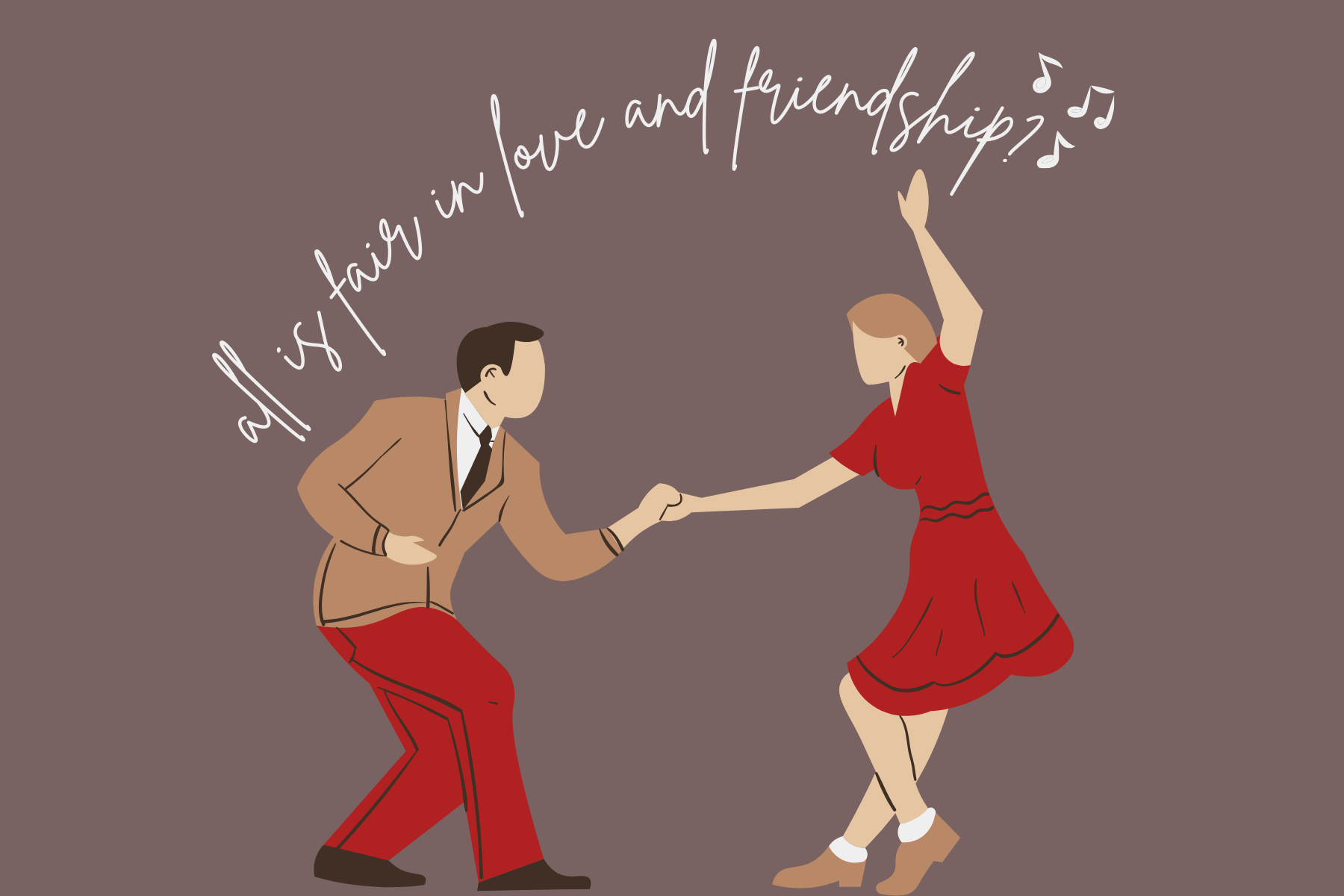On the Record | The complicated boundaries of “platonic” male-female relationships
Photo credit: Design by Lexi Boccuzzi
By Lexi Boccuzzi
“Can men and women just be friends?” As I sat on a subway for the second time in a year following a conversation about the contours of a relationship, I wondered if close platonic friendships between men and women don’t have limits. My conclusion to the age-old question in both instances was the same, a sincere “I hope so,” but reason and the awkward silence that followed seemed to suggest otherwise.
Childhood and adolescence are full of taboos around crossing the line from friend to lover and back again. “Don’t you dare suggest the boy I spend every moment with at recess likes me; that’s gross!” In our teenage years, a confession of love seems like the feat of a century, and once it’s made there is simply no going back—do you still talk to your senior-year partner-in-crime or did you tell them you loved them? For most of us, the answer is one or the other.
Nevertheless, I have grown consistently frustrated about the constant suspicion and scrutiny my male friendships were under. Why should my connections with my male friends be considered any less sincere simply because we could date? Well, statistics seem to show that there is good reason for this scrutiny. For men in particular, “just being friends” seems to be difficult. According to a study of college undergraduates out of the University of Wisconsin, men are, on average, more likely to be attracted to their female friends, to assume that attraction is reciprocated, and to act on it than women are.
With sexual attraction used as the primary measure of perceived interest, a woman may find comfort in hearing, “You’re a really good friend and I value our relationship too much to jeopardize that.” No one wants to feel as though their friends only keep them around waiting for the day they can make their move. However, as friendships go from close to intimate—you know, the unceasing inside jokes, sidelong glances, and “coupley” behavior that confuses everyone in your midst—the problem becomes much more complex.
This type of compatibility and proximity may change the “romantic attraction” dynamic in a male-female relationship. For the same reason that women find it more difficult to have casual sex than men do, deep emotional intimacy, rather than purely attraction, might be a better judge of a woman’s desire to cross the line with her male friends. Women are more attuned to the subtleties of interactions and take longer to fall in love (and to admit it) than men, making it much more likely that she will suffer from the “something’s there that wasn’t there before” moment than he will.
Even if that’s true, he might still be right that the risk just isn’t worth it. Why fix something if it isn’t broken?
In reality, intimate relationships with friends of the opposite sex that border on attraction, aren’t sustainable in the long term. When you do begin dating someone, and especially if and when you are married, your friendships will necessarily change. For clarity, I am not suggesting your spouse must be the only man or woman you talk to—this is not 1950 after all. Nevertheless, new boundaries are required when you are in a partnership. Your spouse should be your best friend, lover, and confidant; if a relationship you’re currently in already fits that description, chances are it’s not platonic.
The phenomenon of opposite-sex friendships is relatively new to our generation. A 2002 study found that 18-24-year-olds were 4 times as likely to have a best friend of the opposite sex than their generational predecessors. Similar research at colleges in 2012 also showed rapidly growing rates of cross-gender friendships. This seems to correlate with a decreased rate of dating and physical intimacy among young adults. Only 56% of Gen-Zers report having been in a relationship of any kind in their teen years, compared to 78% among Boomers and 76% of Gen-Xers. Growing risk aversion among young people, which has manifested in a phenomenon I describe as “high-stakes dating,” seems to have made these very close male-female “friendships” more common.
Men aren’t necessarily wrong to be afraid that breakups can damage a friendship. There are very few things that are harder to hear than “I really want to stay friends. I can’t imagine not having you in my life, and it would feel wrong to kiss you right now.” While I truly think that, with enough emotional maturity, someone might be able to remain in your life forever despite previous romantic involvement. However, the nature of the relationship has to change. No matter how many promises of “friendship” are made, it is impossible for boundaries not to arise when protecting your heart in the wake of a breakup.
So, the real question is, is it worth the risk? I was once told, “I only date friends,” which is generally a policy I subscribe to as well. If we’re right, then the risk has to be worth it, at least in some cases. But in truth, if your relationship has gotten to a point where it would need to change if you started dating someone else, then maybe you can’t really be friends—at least, not until you’ve given dating a shot first or set a boundary. Although every situation is different, I would encourage you to explore a romantic relationship with your closest friend. The reward might just be worth the risk.
Lexi Boccuzzi is a senior in the College studying Philosophy, Politics, and Economics from Stamford, CT. Lexi is also the Editor-in-Chief of The Pennsylvania Post. Her email is abb628@sas.upenn.edu.



